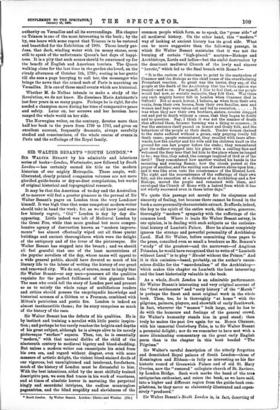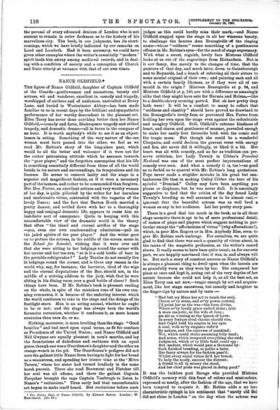series of books—London, Westminster, now followed by South London — has certainly
earned his title as the modern
historian of our mighty Metropolis. These ample, well- illustrated, clearly printed companion volumes are not mere glorified guide-books or dry-as-dust compilations, but works of original historical and topographical research.
It may be that the American of to-day and the Australian of to-morrow will feel a greater pleasure in the perusal of Sir Walter Besant's pages on London than the very Londoner himself. It was high time that some competent modern writer should take in hand the work ; for, as we all know (and some few bitterly regret), " Old " London is day by day dis- appearing. Little indeed was left of Medival London by the Great Fire, while that more gradual but more compre- hensive agency of destruction known as "modern improve- ments" has almost effectually wiped out all those quaint buildings and ancient thoroughfares which were the delight of the antiquary and of the lover of the picturesque. Sir Walter Besant has stepped into the breach ; and we should all feel grateful that one of the least meretricious of the popular novelists of the day, whose name will appeal to a wide general public, should have devoted so much of his literary life to the labour of writing the history of our great and renowned city. We do not, of course, mean to imply that Sir Walter Besant—or any man—possesses all the qualities requisite for the perfect fulfilment of this gigantic task.
The man who could tell the story of London past and present so as to satisfy the whole range of multifarious readers and critics should possess the encyclopa3dic knowledge and
historical acumen of a Gibbon or a Freeman, combined with Milton's patriotism and poetic fire. London is indeed an almost inexhaustible theme; for its story comprises so much of the history of the race.
Sir Walter Besant has the defects of his qualities. He is by instinct and training a novelist with little poetic inspira- tion; and perhaps he too rarely reaches the heights and depths of his great subject, although he is always alive to its merely picturesque "surface" aspects. Then, too, he is essentially "modern," with that natural dislike of the child of the nineteenth century to mediEeval bigotry and blood-shedding. But unless a modern writer can emancipate his mind from his own era, and regard without disgust, even with some measure of artistic delight, the violent blood-stained deeds of our vigorous, but tmenlightened and intolerant, forefathers, much of the history of London must be distasteful to him. With the best intentions, aided by the most skilfully trained descriptive pen, we soon find traces in his work of weariness, and at times of absolute horror in narrating the perpetual kingly and sacerdotal intrigues, the endless meaningless pageantries, and the blind stupidity and slavishness of the
• South London. Ity Walter Sault. London: Chatto and Windaa. [18a.1
common people which form, so to speak, the "prose side" of all media3val history. On the other hand, this " modern " way of looking at ancient history has its good side. What can be more suggestive than the following passage, in which Sir Walter Besant maintains that it was not the burning of certain "high-placed" martyrs—Bishops and Archbishops, Lords and ladies—but the sinful destruction by the dominant mediarra1 Church of the lowly and sincere "heretic," which led to the final breach with Rome ?—
" It is the custom of historians to point to the martyrdom of Cranmer and the Bishops 89 the chief cause of the overwhelming Protestant reaction. So great was the horror, they say, of the people at the death of the Archbishop that the whole nation was roused—and so on. For myself, I like to feel that, as the people would feel now, so mutatis mufandis, they felt then. Was there any such mighty horror felt in London when Cranmer died in Oxford ? Not so much horror, I believe, an when from their own ranks, from their own houses, from their own families, men and women and boys were taken out and led to execution It was when they saw their own brothers, sisters, cousins dragged out and put to death without a cause, that they began to doubt and to question. Nay, I think it was not the manner of death that affected them, because burning was a thing so common ; it was the sentence itself passed on honest and Godly folk, and the behaviour of the people at their death. Tender women chained to the stake suffered without a groan, only praying loudly till death came ; people remembered, they recalled with tears after- wards, how the martyr and his wife and his children knelt on the ground for one last prayer before the stake ; they remembered how the sufferer stepped into his place with a smiling face and welcomed the fiery lane that led him to the place where he longed to be ; was this, they asked, the courage inspired of God or of the devil ? They remembered how another washed his hands in the mounting and roaring flames ; how the clouds parted at the prayer of another, and the smiling sun of heaven shone upon him ; and it was like even unto the countenance of the Blessed Lord. The sight and the remembrance of the sufferings of their own folk, not the execution at a distance of an Archbishop and a few Bishops, moved the people and remained with them, and enveloped the Church of Rome with a hatred from which it has not wholly recovered even in these latter days."
We quote this passage not merely for its eloquence and sincerity of feeling, but because there cannot be found in the book a more personally characteristic extract. It affords, indeed, the key to the spirit of the entire work, this active, generous, thoroughly "modern" sympathy with the sufferings of the common herd. Where it leads Sir Walter Besant astray, in our opinion, is in dealing with such subjects as the ecclesias- tical history of Lambeth Palace. Here he almost completely
ignores the strange and powerful personality of Archbishop Laud. Had Sir Walter, before committing these pages to the press, consulted even BO small a brochure as Mr. Benson's
" study " of the greatest—and the narrowest—of Anglican Primates, he would have recognised that to write of " Lambeth without Laud" is to play "Hamlet without the Prince." And it is this omission—based, probably, on the author's uncon- scious dislike for the " sacerdotalism " of the Archbishop— 'which makes this chapter on Lambeth the least interesting and the least historically valuable in the book.
As a whole, South London is an admirable performance.
Sir Walter Besant's interesting and very original account of the "first settlements" and "early history" of the "Marsh" is perhaps the finest and most original work in the whole book. Then, too, he is thoroughly "at home" with the pilgrims, palmers, players, and showfolk of early Southwark.
In fact, wherever the " masses " bulk large, and he has to do with the humours and feelings of the general crowd,
Sir Walter's humanity stands him in good stead ; then truly he makes the past live again for us. Hence Chaucer, with his immortal Canterbury Tales, is to Sir Walter Besant
a perennial delight ; nor do we remember to have met with a more illuminating commentary on the great early English poem than is the chapter in this • book headed "The Pilgrims."
Sir Walter's careful description of the utterly forgotten and demolished Royal palaces of South London—those of Kennington and Eltham—is fully as interesting as his fine
historic record of Greenwich Palace and of old St. Mary Overies, now the "restored" collegiate church of St. Saviour,
by London Bridge. Such work marks the hand of the true antiquarian enthusiast, and raises the book, as we have said, into a higher and different region from the guide-book com- pilations, be they never so elaborately illustrated and.expen- sively "produced."
Sir Walter Besant'e South London is, in fact, deserving of the perusal of every educated denizen of London who is not content to remain in outer darkness as to the history of his marvellous city. The book, in our judgment, has its short- comings, which we have briefly indicated by our remarks on Laud and Lambeth. Had it been necessary, we could have given other examples where the writer's essentially "modern" spirit leads him astray among mediteval records, and in deal- ing with a condition of society and a conception of Church and State utterly at variance with that of our own times.



















































 Previous page
Previous page